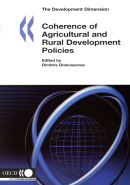Sustainable agriculture
Coherence of Agricultural and Rural Development Policies

Agriculture is no longer the dominant sector in rural economies in OECD countries. But it is still the key sector in managing the land, and many ancillary industries are dependant on agriculture. Both agricultural and rural policy are changing to respond to society's concerns regarding food safety, food security, animal welfare, environmental protection and the viability of rural areas. How far can sector-specific agricultural policies contribute to the economic performance of rural areas? To what extent can rural development policies contribute to the economic performance of rural areas, in particular of agriculture? What are the most effective national and local co-ordination mechanisms to enhance coherence between agricultural and rural development policies? What tools can be used for monitoring and evaluating the performance of sectoral and territorial policy? To what extent will better policy coherence help to improve the welfare of people in rural areas, including farmers?
The OECD Workshop on Coherence of Agricultural and Rural Development Policies examined these issues through thematic studies and country experiences. A key conclusion is that rural is not synonymous with agriculture and agriculture is not always rural as much agricultural production occurs in peri-urban areas. The goals of agricultural and rural policies are different, but policy coherence is essential. A critical issue concerns the nature of policy intervention that is likely to enhance the competitiveness of rural areas. A major challenge is to develop a framework for monitoring and evaluating the effects of agricultural and cross-sectoral policies on rural development and to undertake in-depth case studies.
How to obtain this publication
Readers can access the full version of Coherence of Agricultural and Rural Development Policies choosing from the following options:
-
Subscribers and readers at subscribing institutions can access the online edition via SourceOECD, our online library.
-
Non-subscribers can purchase the PDF e-book and/or paper copy via our Online Bookshop.
-
Government officials can go to OLISnet's Publication Locator.
Related Documents